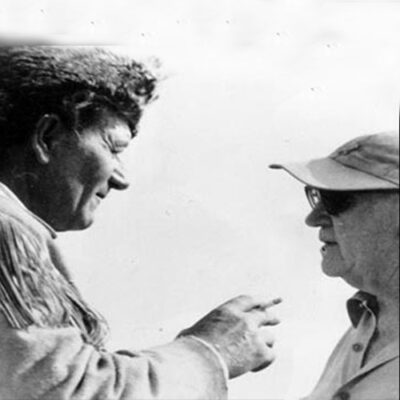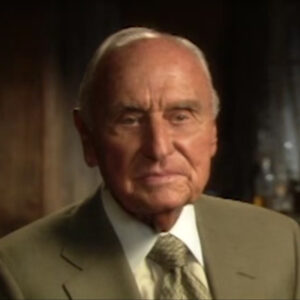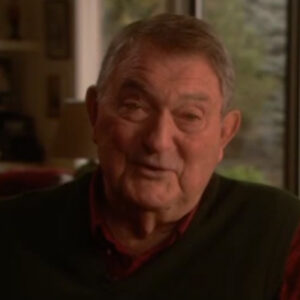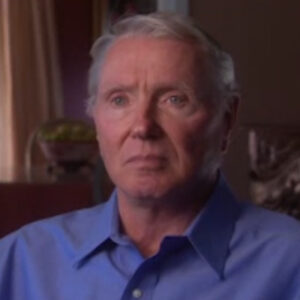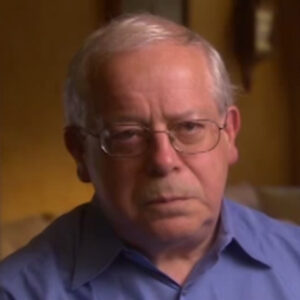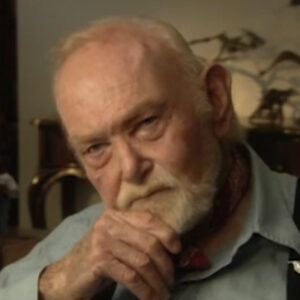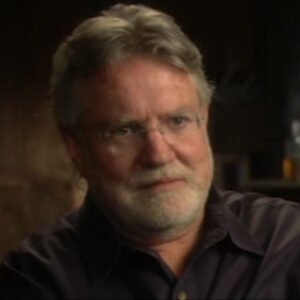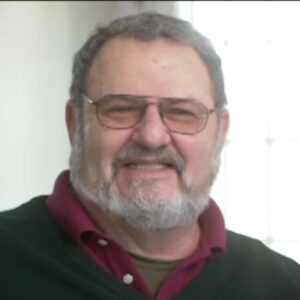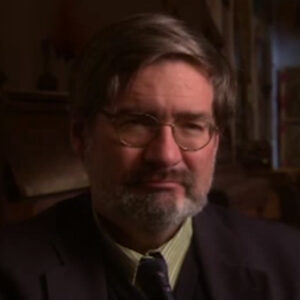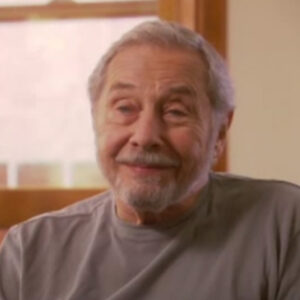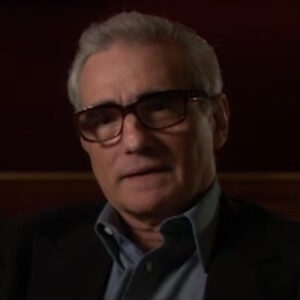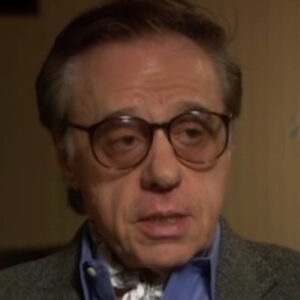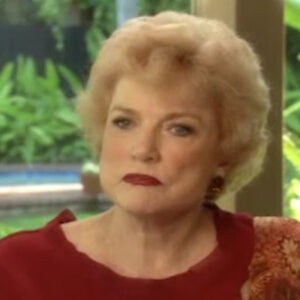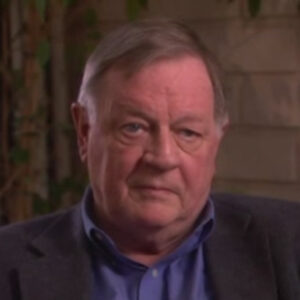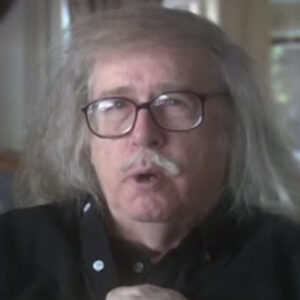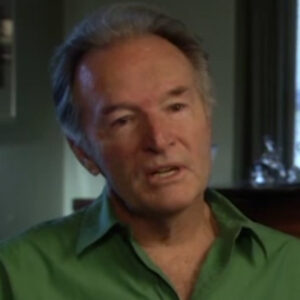Speaker Oh, I was reading this book about John Ford and what is so important to tell us how you and Peter first met John Ford, I’m sorry.
Speaker Oh, right out the door. All right.
Speaker We were writing articles for Esquire magazine, Peter and I, Peter and I were Peter and I were writing articles, I was the note taker, and I also had a lot of input about who and.
Speaker We suggested John Ford, two, to the editor of Esquire magazine, we went out, we somehow wrote We.
Speaker The powers that be finally said yes, and he was shooting Cheyenne Autum in Monument Valley and we flew out there and we got on the set and the head of public relations on the set, there’s always a public relations man on the set of fire and autumn.
Speaker He seemed very nervous and he made no offers to introduce us to John Ford and there we were on the set watching John Ford shoot this major motion picture. And Peter and I just stood around and nobody would introduce us to John Ford. And of course, years later, I came to understand that when two strangers come on the set, everybody on the set notices it, you know, so there’s no doubt in my mind that Ford noticed us, but we were there for a week.
Speaker Nobody would introduce us. And we we got in a friendly conversation with a guy named Jack Gaffing, who was married to Carol Baker, who was starring in an autumn. And we started talking about Ford.
Speaker And it was obvious we knew we had seen almost all of John Ford’s extant films, which are of about one hundred and thirty five films and.
Speaker So Gaffing took pity on us, told John Ford about how knowledgeable we were about his work, and all of a sudden we were, you know, John Ford walked over to us, you know, and said, come on over here, you know, and that was his way of, you know, he didn’t say, I’m John Ford. How do you do? You know, I am done nothing. Just come on, sit closer to the camera. And he took a great liking to me, especially he called me teepee that walks because I wore it was so cold in Monument Valley in the mornings. It got very hot in the afternoon. But I would wear a blanket around my myself and so and I had long black hair and wore black stockings. And I was you know, he used to call me the already one. And, you know, I of course, no wore no makeup. I had one pair of shoes with my name and sneakers.
Speaker They were and Peter was, you know, green and full of admiration and knowing Peter Bogdanovich knowing everything about Ford’s film. So, you know, we started asking him questions and he was not forthcoming at all. He would just say just a job of work. You know, we were I there was one night he invited us up to Goulding’s Lodge, where he was staying. We were down in the in the valley staying in a trailer and.
Speaker One night he invited us to dinner and it was with Carol Baker and Dolores Del Rio and Harry Carey Jr. and you know, Richard Widmark and I can’t remember who else, you know, just just all these stars of the movie were sitting eating with him. And I decided, you know, to open my mouth. And I said I was sitting not too far away from him. And I said, Mr. Ford, I understand you like Mormon music because what?
Speaker And I said, I understand you like Mormon music. What? And everybody now they’re all looking at me, you know, they’re all staring at me because they all know what you know, that I’ve gotten myself into a horrible mess, you know? And I said, I understand you like Mormon music. What? And he made me say it five times. And finally he looked at me and he cocked his head and he said, tone deaf. And, you know, that was the last time. Saw any questions? I did ask him questions. Whenever he would have an interesting story to tell, he would reach over and he would take my pencil away from me where Peter would ask him a question and he would take my pencil away so I couldn’t write down what he had to say, you know? So if he was going to say anything interesting, he would short take my pencil away so that, yes, he would take my pencil away. And he denied, you know, I don’t remember. He was impossible. And it had he was impossible to interview. He insisted that his work was just a job of work.
Speaker He. He was very stubborn about it. He.
Speaker I developed this theory watching him that he actually had more respect for the people that he was making the movies about than he had for his for himself.
Speaker You know, that he really thought they were the real heroes, but he was just the I mean, it seems to demean him, but it’s not you know, you seem to have more respect for the people.
Speaker And then he had for himself, so this particular case, it seems that it was very, you know, the Indians.
Speaker The big effect of our experience with John Ford on Trianon, on them was that years later. We were approached by the American Film Institute and asked to make a film on a director, and they suggested King Vidor, whom we also knew, and. I said to Peter, we should do John Ford, you know, he’s the one he’s the one that, you know, he was the most dramatic in his in his stubbornness and insistence that he really wasn’t an artist and it was just a job of work. And in his refusal to talk about his work, he was more interesting than someone like King Vidor who would talk about his work, you know, and he was so stubborn and impossible, you know, and the documentary that we made on him is very interesting because it demonstrates exactly what I’m saying. I mean, he just simply would not answer any questions in the night that the night after the first day that we shot the documentary, Peter was literally crying. And we were in Monument Valley again. And Peter was crying. And I said, no. He said, I don’t have anything. I got nothing. And I said, no, you got everything because this is what he’s really like, you know? And so he was fascinating and far more. I wish I had the words to describe.
Speaker You know.
Speaker Here he was sitting at dinner in his pajama tops because in the morning he didn’t get dressed, he just put his clothes, his pants on and wore his pajamas to shoot. And so by the time we got to dinner, he was still in his pajama tops with stains. You know, he had been chewing a cigar all day and there were drippings of cigars on the front of his pajamas. And he also walked around with a big handkerchief in his mouth, which you would chew on, and it would become stained by the tobacco stains, you know. So he was the most eccentric, fascinating man I ever saw in my life. I was 20 years old. It was the first I never thought I would ever be attracted to a man of his age. And I found him so incredibly attractive. I thought this this is how younger women fall for older men, you know, because I was just I just thought it was the sexiest man alive, you know, and he was impossible.
Speaker How did he, you know, hair that’s loose on the left side? Right, that one. Yeah. Here you go. Yes or no, on your right side of the right side. Brush back. OK. Thank you.
Speaker Don’t tell me that what we did was bad now. OK, that’s great.
Speaker Well, at that time, I’m clear.
Speaker In the past, I told the story of how you really love that story.
Speaker Well, we did befriend us and did and as I said, you know, I’m not trying to build myself up, but he really particularly liked me and.
Speaker He invited us to sit near the camera and he had the camera on sticks. It was on a small rise in Monument Valley and Monument Valley is a very beautiful valley. That is, you know, that he has discovered himself and everybody knows him there and. Anyway, we were he was shooting a scene, I was going to say we he was shooting a scene with, you know, oh, maybe 30 Indians on horseback and the cavalry, the United States cavalry on horseback. And Ben Johnson and Harry Carey were in the scene.
Speaker And it was one of those classic Ford scenes where he’s shooting a ridge and all the all it would be empty the ridge.
Speaker And then all of a sudden all the horses would come over the ridge and they came toward camera and Harry Carey fell off his horse on purpose. And Ben Johnson, you know, turns around, you know, as all these soldiers and Indians are fighting and running. And it was a big, big shot. And Ben Johnson rides along beside him and Harry Carey does this jump, jump, jump, and jumps up and back the horse and really difficult stunt. And so he rolled on that he didn’t believe in rehearsal, so he just rolled on it.
Speaker Whatever happened, happened.
Speaker And after so, Ben Johnson rescued Harry Carey, in a way, they went in, the shop was over and John Ford said cut and he turned to Peter. And he said, what did you think? And Peters had pretty good.
Speaker Foregoes Stop, stop, everyone, come on around, everyone over here, and he called the whole crew and all the actors and all the horses and all the cavalry and everybody over to this.
Speaker No, while we were on this knoll, you know, and everybody came. Of course, he’s the director.
Speaker All right. Peter Bogdanovich here thinks it’s only OK, so we’re going to do it again.
Speaker And he did it again, and I just wanted to dig a hole and bury myself in it.
Speaker I was so embarrassed and of course, then he did it again and after it was over, everybody had to do was a terribly difficult thing, you know, and Ben Johnson had to do it again and Carrie had to do it again. And the whole thing had to happen again. And then when it was over, he said to Peter, How did you like that?
Speaker Peter said, Wonderful, you know?
Speaker But it was you know, it was just classic John Ford bullying. And I, I, I’ve never I told Peter the story and he says it never happened. He just insists that I’m gilding the lily. But how could I forget such a thing? You know, how could I make up such a thing? It happened. It’s not a story I heard. It happened to me. I was so embarrassed not to happen to me. My husband was so humiliated by John Ford.
Speaker And of course, later on when I heard all those stories that John that John Wayne would tell about how Ford would bully him and you know, all the stories once this happened, you you understand, you know, you don’t fool with this man and and Ben Johnson on shining on them. Never spoke to John Ford.
Speaker They didn’t he didn’t ignore you, was it was no. Good morning, Mr. Ford or Pappe, as everybody called him Pappy.
Speaker And he told me the true story.
Speaker I asked him, you know what? I was chasing him around the young.
Speaker I was in love with him. I just started going crazy about him.
Speaker And and I kept saying, why haven’t you worked with Ford for 12 or 15 years? You know, what happened?
Speaker What happened? And he would just never tell me anything. And after, you know, we were there for weeks and. Finally, Ben broke down, you know, I guess I guess he took a liking to me or whatever, and he said, well. We were shooting Wagon Master. This is what he told me. We’re shooting wagon master and there’s a major scene of the wagons going up over the mountains. And he said Ford came to him because of Ben Johnson is a horseman, he was a world class rodeo champion and he knew everything about horses and wagons and everything. He was an expert and he told me that Ford came over to him and said, how would you get those wagons over those mountains? And Ben said to me. Well, the old man, you know, Papis asked me some advice, I’d better think about it before I give him my opinion, you know, I better really have a good idea. So he thought about it for a couple of days and then he walks up to Ford on the set. Ford is directing something else, and he says about that question you asked me the other day, you know.
Speaker This is how I would do it, you know, if I was trying to get those wagons over those mountains and Ford said, why are you trying to get my picture, get the hell away from me?
Speaker Who asked your opinion? Who do you think you are? The director?
Speaker You know, and Ben, Ben is a man, a man, you know, you just don’t treat Ben like that. You don’t treat Ben Johnson like that. He’s and he said we never spoke. That was the rest of the picture. He said that was the last picture I did with him. And he also told me years later that Ford made a lot of money out of him.
Speaker He had them signed to a personal contract and he would loan them out for more than what he was paying, paying Ben Johnson, and he would just pocketed the extra, you know. So Ben, Ben didn’t make a hero out of Ford at all.
Speaker And Ford had a rule. And we found out about it in Cheyenne on him. No women on location, no wives, no girlfriends, no nothing. Ben brought his wife. The hell with it, you know, he was just not afraid of John Ford. He didn’t say anything. And for you said he had one patch, the patch, and we always it we ate with them often after that, you know, I don’t know why I have to eat after Morman music story.
Speaker You know, he would even, you know, but he would you know, I would walk into the dining room and he would look like this would go, oh.
Speaker It’s Polly, come on over, you know, and this is the way he focused, you know, he would take that one good eye and he would put his hand in front of it and he would look, you know, and I’ve noticed that you can do that. It works. I’ve tried it. And so that was how we met him. That was how we found out nothing about him.
Speaker We ended up describing his you know, the article is there to be read. We ended up describing and everything that he did. And, of course, that little story was omitted, which is too bad.
Speaker What were your impressions? This is a job for this would be his last film.
Speaker I know. But he wasn’t declining. He wasn’t declining. He was drinking. You know, but I found out later, you know, that he was drinking. You know, I really was very unaware. He was as my impression, he was as vigorous and jaunty.
Speaker And is that a good word for him? Yes, and electric.
Speaker And as I said, he was incredibly sexy in spite of the fact that he wore his pajamas to work and.
Speaker You know, I certainly try and autumn doesn’t compare as far as declining, you know, Shion, Autumn does not compare.
Speaker It’s it’s really I haven’t seen it recently, but I’m sure it doesn’t compare in any way to the man who shot Liberty Valance, which is, you know, balance, which is. After, before, before.
Speaker He was master of every thing, saw everything.
Speaker You know, he would be the fascinating thing to watch him do was he would finish the shot and then he would start walking. And this is Monument Valley.
Speaker This is just picture a vast desert with amazing mountain sticking up, looking like some sort of.
Speaker My giving you what you want.
Speaker Can you see the table? The other thing is that the clock, you would love a child. Oh, my God. I never thought that would ever happen to me. I was 20 years old. Who’s the sexiest man I’d ever seen?
Speaker And I won’t even go in.
Speaker There’s other things, but it’s just too horrible for the whole world to see.
Speaker Well, I will tell you the story that probably end up in that we’re clear he was you know, he had blackheads on his face. You know, he was unkempt. He was you know, there was a there was a man who was the head of the wardrobe department who took care of him and made sure he would walk him out of his out of his cabin in the morning and take him home at night and.
Speaker I’ve forgotten that guy’s name.
Speaker You know that no women on location, you need to talk to other people about that because, you know, that’s a I’m sure Harry Carey talked about that a little bit, but.
Speaker The fascinating thing about him was that he would finish one shot and then, you know, he had many little pieces of paper or anything, you know, any shot list which, you know, he would start walking in, as I said, this vast desert of red sand and he would start walking, you know, all by himself.
Speaker You know, he would just never look around. He would just start walking. And then right behind him would be William Clothier, the cameraman, walking right behind him. And then behind him would be the first assistant director. And as far as I knew after that would be the second assistant and then the operator, camera operator.
Speaker And so there would be this long line of people, you know, following Ford out to the desert, you know, and then he would just stop at a certain spot. And then everything would happen, the camera would come, you know, point and the camera would come and, you know, I didn’t know enough about film to know whether he dictated the camera lens or anything like that. But, you know, he was just vital. He didn’t have a shot list. He worked off the cuff. He was, you know, and there there’s a million stories.
Speaker You know, we were there so long that the I think the guy’s name, the producer’s name was Schmidt. And.
Speaker Schmidt started complaining one night at the dinner table, Smith, Schmidt, I’m sorry, I can’t remember his name. He started complaining one night. The producer on Shine On, Shine on Him started complaining one night because there were no closeups. There’s not enough close ups in the movie and.
Speaker John Ford turned to Peter and said, there’s a word for that. And Peter’s Yugoslav and by birth, not by birth, but by heritage, and Peter said, what is it, sir? What is it, sir?
Speaker And he said. Which is the Serbian word. And so that’s how he treated his producer.
Speaker And then the producers are complaining that we’ve been there too long, that he needed our our trailer for other people, for other actors and stuff, and John Ford said to the producer, I’ll tell you what, I’ll move out. They can have my place, you know?
Speaker So he was just you couldn’t deal with him. He was just in you know, he was.
Speaker Impervious to damage or control. You know, he there was something that happened years later that was very interesting. He liked us so much that he invited us to his house and we became friendly with him.
Speaker We went to Christmas dinner. There was quite popular. We were not the only people there. You know, all the old Ford people were there and.
Speaker Then.
Speaker We eventually got to make pictures of our own and we made the last picture show and he was very helpful in getting Ben Johnson because Ben Johnson did not want to do that film. He didn’t want to say the klap. He didn’t want to say that. He said, my mom is going to watch this film. I don’t want to say that. And John Ford helped, you know, and.
Speaker During the making of the picture, my husband, Peter Bogdanovich, fell in love with Cybill Shepherd, the star of the movie and one of the stars of the movie, and it was very devastating to me. I had two small children and I didn’t quite know what to do. I was doing the sets and the costumes and the makeup and the hair. I was doing everything I was doing. Symbol’s hair. It was incredibly difficult for me. And I stayed the course. I did my work. Nobody was going to force me off my picture. I didn’t care what Peter did. You know, I was not going to, you know, go home and sit there and think about it.
Speaker And when I got back and it got around town because the picture of the last picture show became.
Speaker Immediately, sort of a cult hit in what we call the Bel Air circuit, which is where people would get prints and films before they were released and Peter became very hot because of this film.
Speaker And.
Speaker I got a summons from John Ford’s daughter, Pappe wants to see you, you know, so I went and this was way after 2:00 a.m. This is 1971.
Speaker And I wondered what he had, you know, what he had to say to me, he heard what happened. He wants to see you. So I went to the house and.
Speaker It was right across the street from where Peter was later to live, and it was in Bel Air and I remember noticing because both he and his wife couldn’t see very well. I remember noticing as I was going up the spiral staircase to his room, he always stayed in his room. He slept in his bed. He stayed in his bed all day. He never got out of bed.
Speaker And what I didn’t know but what should have been obvious to me is that everybody in that house was drinking.
Speaker You know, Barbara Ford, his daughter was drunk in her in her negligee. And this was about three o’clock in the afternoon. And Ford was in his bed when he had his bedroom, was lined with books, and he had a just a sheet over his body. And he was wearing his pajamas. And I went into his bedroom and. SAT down and he said, I heard what happened.
Speaker And I said, well, you know.
Speaker It’s an occupational hazard of the disease of the occupation. He said, I heard what happened. And I said, well, it’s an occupational hazard of the job.
Speaker You know, and he said, well, I never did it. And then he took the sheet that was covering his body, you know, and he shook it because he had a cigar in his mouth and all these cigars, ashes were all over the sheets, you know, and he shook it like that. And he was naked from the waist down.
Speaker And I couldn’t help but try to get a look to see because I had heard the rumor was that he’d lost one ball in World War Two, you know, that one of his balls got shut off, you know, and I remember saying, you know, I wonder if that ball is still there. You know, if I wonder if he only has one ball and he was flirting with me. And he said after he shook the sheets and showed me his equipment and, you know, you know, looked at me and then he said, I’ll tell you what.
Speaker And I said, What? He said, I’ll move in with you. And you know what? He was the only one who said something that made me feel better. That was like I it was maybe I laughed, but I wish I hadn’t laughed because it was you know, it was very generous.
Speaker And he gave me a look at what I think I might be the only person who’s ever seen John Ford half naked.
Speaker Oh, did you ever talk to Wayne about his relationship with Bush? Right. You have to talk to Wayne about his relationship with John.
Speaker Yes, but I think you better leave those stories to to Peter Wayne, really talk to Peter more than you talk to me.
Speaker You know, I was told just in case I know I well, they I they’re not so good. Honest, honest. He he was talking to Peter all the time about and you know. Being a big star, he didn’t tell the interesting stories about John Ford that somebody, you know, he was a very complicated relationship.
Speaker I think that I couldn’t.
Speaker Sorry, I can’t get around that, you know. Sixty five. Sixty six. We’re in the middle of Vietnam. And a lot of people today, even today politically, can’t serve with Ford for way. Right? I know. I mean, you know, you think Wayne super patriotic, right. As you say, the most insane person, even a character in the strongest way, Ralph Bellamy.
Speaker But there really what was you know, I mean, if you see Ford’s entire opus, you can’t have that opinion. You know, I don’t know what Ford’s attitude was about Vietnam, you know, I never talked to him about politics because I always thought that, you know, an artist was really, you know, I considered him to be a great artist and. He was an enormous history buff and he had to know enough about where warfare, I thought to know that we could never win that war. It was a guerilla warfare situation and we would never win it. There was a vast difference between the two of those people, John Wayne and John Ford. I mean, certainly Ford made Wayne, you know, into the star that he was. But Wayne was just not as colorful or as interesting at all. You know, there was just no comparison between the two.
Speaker And I mean, Ford never made any movies about, you know.
Speaker The war that would that would give us any sense of what he thought about Vietnam, so, you know, and I was definitely aware of the fact that, you know, Wayne was this sort of maniacal patriot for the war toward against the Vietnamese Vietcong. But because I love Ford so much, you know, I think I refuse to even consider the fact that Ford you know, there’s a famous story about Ford. Somebody else could tell better than me about how. Something had happened to the Directors Guild where he said, My name is John Ford, I make Westerns, so I’m sure somebody told that story. You’ve got that. And. That was about the loyalty oath, wasn’t it? You know, and nobody ever told me that story, you just heard it in other documentaries, so I couldn’t tell it from personal experience.
Speaker But you could use your feeling that they weren’t. No, I think he was.
Speaker To me, Ford was a man, you know, for instance, I’m one of the few people I really think I’m maybe other people clashed with Ford, but I did clash with Ford. We wrote the article, Peter wrote it, and I helped. You know, I my notes were very important. And, you know, my opinions were taken by Peter very nicely and. We sent a copy of the article in Esquire magazine to John Ford before we turned it into Esquire and Ford. Either wrote or called, I can’t remember which.
Speaker Peter and I just wrote it, he must have written it because.
Speaker Those are the days when you didn’t make those kind of phone calls and you just hated the article. He hated the fact that we said that he wore his Navy admirals over a windbreaker with stars on their shoulders.
Speaker He said, I didn’t even know those stars were on my shoulders. And, you know, he hated the fact that we quoted him using the vernacular. He I remember he, you know, all the bad language. You know, he he said, I never talked like that. He denied it, he was just it was just a vindictive, angry letter. And we had mentioned that some woman came by the set and he said I my wife would be furious if she knew that woman came on the set. You know, that, you know, he just went crazy. He hated the article. And Peter was so sensitive about it, you know? And I got furious because John Ford made a movie about Spig Reid, who was a great friend of his, and he showed warts and all, alcoholism, everything, you name it, you know. And so I wrote him a letter and I said, you know, we’re doing just what you did was pigweed. We’re showing what we saw and warts and all, you know, and you were wearing that oh, that windbreaker with the stars on it. And you did use bad language and you know you. Well, I went on and on and on and I sent it off to him. And it was so funny because. Oh, not funny, but strange.
Speaker A week later, I got a letter addressed to me and it just said Warner Brothers, and then it said John Ford and typewritten, you know, and I got a letter from John Ford. My God, you know what? Because I had written him, he’s written me back and God knows what he’s going to say.
Speaker So I open up the letter and inside is my letter. Inside the envelope is my letter. And then there’s this broken cigar, a whole cigar. But it had gone through the mail, so it was all kind of crumbly and smashed up and everything. And so I took that out and got all over the table, made a big mess, and I opened my own letter.
Speaker And down at the bottom in Ford’s handwriting was, all right, let’s smoke the peace pipe, John Ford. And so he just, you know, he accepted my fate. He let me win. Let’s smoke the peace pipe.
Speaker And I wish I had saved that letter. I just can’t believe it’s gone, you know, but it’s gone. You know, what did I know? I just didn’t realize, you know, it was just.
Speaker Wouldn’t have made any sense to anybody if they didn’t know the story anyway, but you always left me after that.
Speaker I fought back and you can you know, he’s not he’s not he he was fascinated with the West.
Speaker I just went to see him, I think is called the Cowboys on Broadway or Broncos and Broadway, bucking Broncos and Broadway. It was a silent black and white John Ford film.
Speaker And with Harry Carey and forgotten the year, it’s 19 somewhere around there, it’s just, you know.
Speaker He made Westerns, you know, I’m sure you already know the story, I mean, he made Westerns, he was he admired people who accomplished things as far as. Battles and bravery and knowledge of the enemy, you know, he.
Speaker What Australia is going to tell about him.
Speaker I forgot what the story was. It’s always the first short, short film you saw a personal interview and hold you.
Speaker Oh my God. Well, I was probably.
Speaker Nineteen, and it was.
Speaker She wore a yellow ribbon. And I was an Army brat, and I never really, really understood the Army until I saw John Ford’s films about it and. The only thing I can say really about John Ford, as far as I mean, I was of course, I fell in love with the film and the film did well on a lot of Academy Awards.
Speaker I think that that one wasn’t nominated, I think, for best cinematography. But what happened?
Speaker Was that I realized that all the pomp and ceremony that meant that I didn’t really.
Speaker Yet, you know, when my dad was in the army and wearing his colonels, you know, Eagles and his Signal Corps, you know, all that nonsense that seemed like nonsense to me.
Speaker I realized it had a point and which was definitely made in Rio Grande Day and Fort Apache, that knowledge, you know, knowledge of the Indian was critical to, you know, surviving and.
Speaker I just thought he was the greatest filmmaker, I mean, obviously Orson Welles is, you know, what what can you say about Orson Welles? But if you if you made me pick what movie I would take with me, it would be she wore a yellow ribbon or Rio Rio Rio Grande. Rio Grande, because I always get Rio Bravo on Rio Grande mixed up.
Speaker But choose a picture with.
Speaker It would be if I had to take a picture with me, that would be the only picture that I could watch ever. It would be real, real grand. You know, that would be my favorite picture, or she wore a yellow ribbon. You know, I could watch it.
Speaker Oh, the thing I want to say is that every time I look at a John Ford film.
Speaker It’s on Turner Classic Movies now or whatever, or I get a chance to go see the the the the film on the big screen, I say I’m going to watch and see how he does it. I’m going to watch because I’m a filmmaker.
Speaker I’ve made lots and lots and lots of movies. And I can’t. Stop getting involved in the picture and forget to see how he did it, you know, and it’s so simple that it is impossible to imitate, you know, it’s just he just would set the camera up and let the cavalry come across the river.
Speaker The air conditioning.
Speaker Look, I’m getting so excited about John Flory.
Speaker So that was the problem for me with Wayne was that she just wasn’t that interesting and John Ford made him into what he was and his attitude toward Ford was.
Speaker A mute kind of complex.
Speaker Confusion of hate and love, and therefore he was very interesting about Ford, he never told me any stories about the great humiliations, which are the fun stories. You know, he it’s almost as if he. Had to demean Ford, and when Ford was dying, Wayne wasn’t around. So I didn’t see him and I wasn’t that I was there all the time, but I asked, you know, if Wayne came around and he didn’t, you know, so I, I you know, I just think Wayne Wayne should have been more grateful.
Speaker You know, and more, but I can understand, you know, that maybe Ford, you know, tore into him in such a serious way, you know, because he just really tore people apart.
Speaker You had to be a man like Ben Johnson in order to stand up to a man like John Ford. And I don’t think Wayne was anything like Ben. There’s nobody like that. He’s the nicest man I’ve ever known. And when he died, I went to his funeral, I flew just to to Phoenix and went to his funeral and cried like a mistress, you know, I just wept and wept and wept, you know? And I went to John Ford’s funeral, and I’ll never forget his wife was in a wheelchair.
Speaker And she had on board with I don’t know what board one thought she had on some kind of shoes, you know, they were high heeled sandals or even though she was in a wheelchair and she had the brightest reddish toenails that you ever saw, you know, it was so incongruous. You know, it just was just she went to have a pedicure for her husband’s funeral.
Speaker But she also told me a lot of stories. She said to me, you know, she had this really low voice, you know, and she told me the story.
Speaker About how they used to have two Rolls Royces, one for themselves and one for the children to go to Las Vegas, and she said those were the days before the income tax.
Speaker We had all the money in the world. And she said, your husband wants to be a movie director. And I said, yes. And she said, well, then don’t worry about anything except what the back of your dress looks like because it’s there goes.
Speaker You know, she said it says. We won’t get anything out of it, you know, and she also told me the story of Jane Fonda’s mother’s suicide because they were very close to.
Speaker I’ve forgotten Jane Fonda’s mother’s name, but they heard Mary told me they heard that that she had slit her throat and they grabbed Jane and Peter Fonda and took them out on the ironer, which was their big schooner. And they forgot to tell the cook in the galley about Jane Fonda’s mother.
Speaker And the idea was to keep it away from Jane, what had happened. And Jane came down to breakfast the next morning to the galley and the cook asked her, how is her mother?
Speaker And Jane Fonda said, didn’t you know my mother slit her throat from ear to ear, so she she knew, you know, she knew everything that they were trying to keep from her, you know? But it shows you what kind of a world it was, you know, where the Fords were immediately, you know, take Jane and Peter away to protect them from what had happened.
Speaker You know, they did interesting, you know, interesting things. You know, valuable things.
Speaker So, you know, Russell Ford was the last thing you as far as being more than just their girls.
Speaker Put pressure on the right side.
Speaker When John Ford was going into the grave, when his body was being lowered. For me, it was as if a great redwood tree had fallen over in the forest, it was. I thought there will be no more great films. It’s not true, it’s not true. I just saw a good one last week, you know. I’ll never be able to make a film that’s as good as John Ford’s pictures, but.
Speaker Oh. So a nice thing about the farmers across the plains, the. Yeah.
Speaker OK, I think obviously in this interview, you will be interviewing other directors who admire John Ford, and I think that the most interesting thing about Ford is that no matter how hard you can make an Orson Welles picture in a way, you can make a Don Siegel picture. You can make a Howard Hawks film. But you you can’t imitate Ford. You can’t. In other words, I think all these filmmakers who admire his work, it’s really interesting that Orson Welles. Looked at Stagecoach for a year before he made his first film, and Orson told me that himself and I’m sure it’ll come up, somebody else will mention it in the interview is about Ford.
Speaker But it was Stagecoach that Orson Welles looked at and out came Citizen Kane. You know, how came Citizen Kane?
Speaker He he told me that he was influenced by the fact that they told him, you know, they being that, you know, he was a new filmmaker in town and what did he know? He was a radio director and and an actor.
Speaker And, you know, they must have tried to bully Orson. And they told him, you know, you couldn’t see this. You know, you weren’t allowed to show feelings and, you know, blah, blah, blah.
Speaker But he he looked at Stagecoach with every single technician, the cameraman, the soundman, the actors.
Speaker You know, the I guess that would be it, wouldn’t it really say, Ed, thank you and.
Speaker So.
Speaker Orson was influenced by Ford. But he became Orson Welles, you know, he was that strong, you know, if.
Speaker But for me, I wouldn’t even attempt to western, you know, and anybody who does fails, you know, I mean, I. I have. He’s just a master, and I have seen the early, you know, the early and did discover that he was an actor originally, you know, I was the one who found out that he was an actor.
Speaker When I told him he denied it. He completely denied it because I went down into the vaults of Universal and found the production reports and found his name on the acting list, you know, of the Francis Ford films and.
Speaker Good, so be it, so I don’t even know what I was going to say, I get some calls. I went to the vaults and I found out that he was an actor.
Speaker And I by this time, I was teasing him and, you know, I knew I was you know, I had been burned by him enough. But, you know, I knew that I was special. He said to me, you know, you know, he made a special effort to make me know. He said, you understand? You know, he I was safe from him. Basically, women were safer anyway. I think I don’t think I realized either. I was a pretty. Pretty woman, you know, pretty young woman, I was only 20, I didn’t wear a new makeup. I was young, I had hair down to my ass. I was, you know, such a hippie, but.
Speaker I said I heard I knew you were an actor, and he said, never, you know, never. I said you were. I saw the production reports and he said. Now, you know, and for a while I doubted my own, you know, paperwork, but he started out as he was a property master, we know that, but he acted in as far as films.
Speaker And I have to that’s the end of my story is about John Ford.
Speaker OK, that’s great. So.

